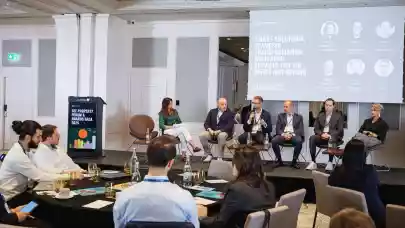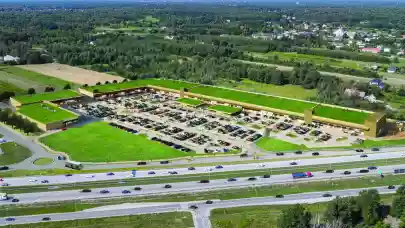
At SEE Property Forum 2025, the conversation around the future of real estate took a bold turn — from smart buildings to smart relationships. Industry leaders agreed that while data, automation, and ESG strategies are reshaping commercial real estate, true innovation begins with understanding people. The discussion, moderated by Vessela Valtcheva-McGee of GBCI Europe, explored how developers, investors, and service providers are using technology not just to optimise buildings, but to redefine how tenants experience and value them.
Valtcheva-McGee set the stage by highlighting the critical role of buildings in global sustainability efforts. "Buildings are responsible for almost 40% of global CO2 emissions," she emphasised. "This is not just a challenge, but a tremendous opportunity for transformation across the entire real estate ecosystem."
The discussion revealed a unanimous focus on data-driven solutions and tenant experience. Emma Toma from AFI Romania shared insights into the company's commitment to green certifications, noting, "We are constantly investing in high-tech, efficient buildings while supporting our tenants through comprehensive fit-out support. Our goal is to create a balanced market where landlords can achieve fair returns and tenants receive the most modern, technologically advanced spaces."
Hubert Abt of workcloud24 provocatively challenged the industry's current approach, arguing for a radical reimagining of building management. "We need to shift from traditional operational models to a stakeholder-centric approach," Abt stated. "By measuring tenant satisfaction through metrics like Net Promoter Score and linking it directly to lease incentives, we can create a truly responsive real estate ecosystem."
Technological innovation emerged as a key theme, with Tomas Zach from M2C highlighting the potential of smart technologies across different asset classes. "Data collection and intelligent management are no longer optional," Zach explained. "From logistics to retail and residential sectors, the ability to collect, analyse, and act on building performance data will separate market leaders from followers."
Andrei Ianculescu of Cushman & Wakefield Echinox emphasised the need for broader industry participation in sustainability efforts. "We need medium and small developers to invest in smart metering and ESG certifications," he argued. "Currently, many existing buildings lack the data infrastructure necessary for meaningful sustainability reporting."
Andrei Boca from Globalworth stressed the importance of adaptability in a rapidly changing market. "Our industry must remain flexible and professional," Boca noted. "Good products and skilled professionals will always find a way to succeed, regardless of market challenges."
The panel consistently returned to a central theme: the human element remains paramount, even as technology becomes increasingly sophisticated. As Abt put it, drawing inspiration from Steve Jobs, the key is to "think from the customer backwards" to create truly exceptional real estate solutions.
The panel made it clear that the future of real estate lies not in technological gimmicks, but in holistic, human-centred approaches that leverage smart technologies to create more responsive, efficient, and enjoyable built environments.



